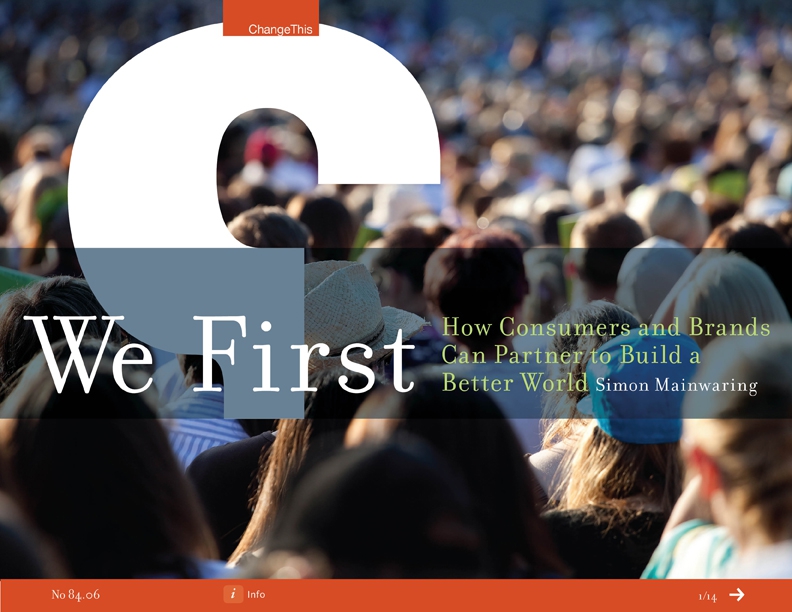We First Book Video: "We-defining Me" from We First on Vimeo.
Some of you may have been confused by the last post on capitalism. You wonder how is it possible that companies are not doing enough.
Without giving you all the facts and figures, the main point is that the world is facing staggering problems in areas of global health, global homelessness, global climate change, global conflict, food security and agricultural development problems, energy instability or deficiency, water scarcity, gender disempowerment, unemployment, underemployment, education, youth leadership, etc. The list goes on. Yes, it’s true that most countries give a small percentage of their budget to help with foreign assistance, foreign aid, or international development. But this is not the same as the 1% of pretax profits the average company gives to charity.
To explain, let’s use the U.S. as an example. It is true that less than 1% of its budget goes to foreign aid, so it seems similar to the average corporation, on first glance. But remember, much of what countries do is domestic. If the US works on shelter and housing domestically, it’s the Department of Housing and Urban Development (HUD); if they work on it in foreign countries, it’s the U.S. Agency for International Development (USAID) or Department of State. If the U.S. works on energy security domestically, it’s the Department of Energy (DoE); in foreign countries, it’s USAID or State. If the U.S. works on public health domestically, it’s the Department of Health and Human Services (HHS) and the National Institutes of Health (NIH); in foreign countries, USAID or State (or the international parts of NIH, HHS, and a bit of Homeland Security). So when you say that the U.S. spends less than 1% on international development, remember the key word is international. They are also doing local or domestic development all the time.
Still, I do believe the government could do more. Generally, countries that spend a greater proportion of their budget on effective education and health have higher standards of living (Norway, Sweden, etc.). So I do want the government (around the world) to do more. However, I’m specifically speaking about corporations due to the limitations of government. Before talking about corporations, let’s think about the benefits the government has. It has 60 years of knowledge in foreign aid and over 80 years of knowledge since the New Deal (U.S. government). It has guaranteed income—the tax base. It can create legislation or use executive power. And it has existing administrative, programming, and financial infrastructure at the local and state levels. However, the government is limited by fraud, corruption, bipartisan politics, jarring bureaucracy. In trying to solve problems of global and domestic poverty alleviation, the government struggles (or doesn’t struggle) with national interests versus global need, disagreements about where the poverty line should be, lack of enthusiasm towards social programs for the poor (in the U.S.), and feelings that the non-profit sector, families, and churches should handle poverty efforts.
The non-profit sector also faces great advantages and limitations. Remember, when I say non-profit sector I’m including philanthropies/foundations, NGOs, charities (501c3 status) and non-profits which can have other tax exempt status. Generally non-profits enjoy being seen as credible and neutral. More generally, non-profits have the advantage of super-motivated volunteers and staff, potential ability to attract big contributions, field expertise (many NGOs have feet on the ground in various countries around the world or in local communities), and limited staffing, bureaucracy, and overhead. Obviously this does not apply to all NGOs, however, the big large NGOs are not most NGOs. Unfortunately, NGOs and the non-profit sector also deal with fraud and corruption like the government. There can be policy conflicts between headquarters and people out in the field. Money is always a problem. A lack of coordination between NGOs working on the same or related problems diminishes impact. And NGOs are always subject to the agendas or requirements of donors and host country governments.
And that leaves . . . you guessed it—corporations. Of course, social enterprises (the 4th sector), NGOs and the non-profit sector are doing all they can. They can continue to improve efficiency, but they are doing a lot. Governments need to do more. However, corporations have not really scratched the surface of their potential to contribute to solutions to the major problems plaguing the world, today.
We looked at the short history of corporate charitable giving, Corporate Social Responsibility (CSR) movement, and Cause-related Marketing (CRM). So yes, to summarise, U.S. corporations went from 0 charitable giving in the early 1900s when they were barred from making such contributions to giving to arts and culture in the 1950s and 1960s. In the 1970s they began to give to civic causes, and then moved to national and global issues of poverty and social justice in the 1990s and 2000s. And yes, contributions grew from 0, then, to $14 billion in 2009. Still it’s a small percentage of the profits that companies pull in annually. Most importantly, CSR is still somewhat of a second thought and operates with problems and deficiencies in many companies. Here are few of the problems according to Simon Mainwaring.
• Giving is disproportionate to profits and salaries – The $14 billion in 2009 is small compared to money (billions) made by investors and top executives not to mention bonuses.
• Top executives are uninvolved and insincere – In a 2010 McKinsey survey of 1800 respondents, more than 50% considered sustainability to be “very” or “extremely” important. Contrast that with the fact that only 30% say their company invests in sustainability and embeds it in business practices, while only 25% said that it is a top priority for their CEO.
• Companies fail to understand CSR – According to the same survey, 20% of executives claimed their company has no definition of sustainability. Fifty-five percent thought that CSR related to management of environmental issues; 48% thought it was related to governance issues like ethics, regulations, and compliance; 41% thought it was related to social issues like worker rights and labour standards.
• CSR efforts are just window dressing – The great majority of companies still use CSR as a tool for public relations and their public image. Simon Mainwaring even quotes the Economist as saying “ . . . for most public companies CSR is little more than a cosmetic treatment. The human face that CSR applies to capitalism goes on each morning, gets increasingly smeared by day, and washes off at night.”
• Companies spin their CSR and CRM – Companies have been exposed for green-washing, cause-washing, and local-washing in order to market themselves.
• CSR results and measurements are scattershot – There really are no national or international standards of achievement in CSR. So few companies measure their results. Most of us use various watchdog agencies to watch, analyse, rate, and rank corporations on their socially conscious good work.
When I say “it’s not enough,” this is what I mean.
I’ll close with a report mentioned in We First. One of my favourite people is Paul Newman (God rest his soul). When he was alive he convened a group of CEOs and founded the Committee Encouraging Corporate Philanthropy (CECP). The CECP commissioned a report from McKinsey to project 10 years into the future to see if social responsibility was important for the future of corporations. The report predicted 5 important trends between 2010 and 2020: (1) a rise in the power of emerging nations, like China; (2) a shrinking of the labour force and talent pool due to demographic changes; (3) a global integration of capital markets, trade, and technology; (4) natural resource scarcities; and (5) competition among nations to attract work.
The report mentioned 4 scenarios based on how extensively corporations adopt true social responsibility.
Scenario 1 – People put greater demand on companies for social change and corporations react positively. Consumers began to trust corporations that they will agree to enact social change. Consumers and corporations become partners in actually improving the world. And governments allow corporations to voluntarily meet these social expectations.
Scenario 2 – Corporations try to adopt some social changes, but citizens fail to trust them. As a result, government and NGOs stop partnering with corporations to enact social change, and we are left with a “patchwork” of international laws and standards and a “bifurcated system of capitalism.”
Scenario 3 – Society’s expectations of businesses continues to rise, but companies refuse to enact changes for positive global impact. Governments enforce regulations reducing capital and increases expenses for companies. Citizens (who are also consumers) distrust companies creating a problem of expectations.
Scenario 4 – Societies and companies cannot match their expectations or their engagement levels so there is an ever-downward spiral of social responsibility. Trust in business drops low enough that the economy suffers exacerbating the very global social problems we are trying to solve.
The report says that only the first scenario is the logical and preferred scenario. Each of the rest does not have a beneficial outcome for corporations. Which of the scenarios do you think is likely to happen? Do you see any other options or scenarios not listed?

